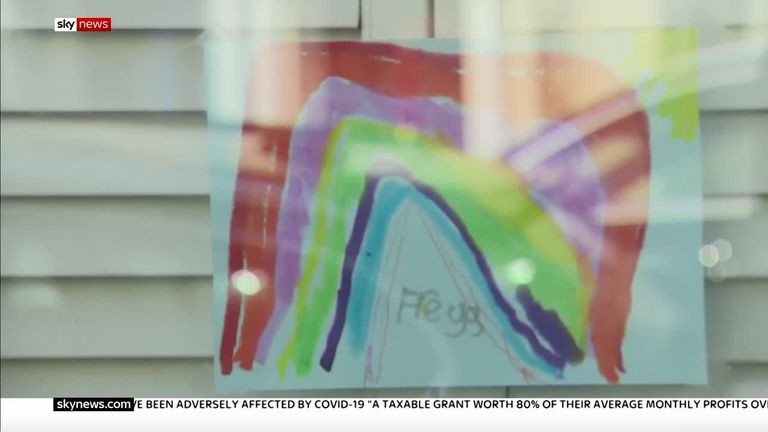Sarah-Jane Mee shares her fears and concerns as an expectant mother in the time of coronavirus
Sky News presenter Sarah-Jane Mee asks experts the questions on her mind as she deals with pregnancy during the era of COVID-19.
Saturday 28 March 2020 11:08, UK
"See you in a couple of weeks!"
Those were the last words I said to my team as I left the Sky News studios one evening a few weeks ago, ready to embark on my annual leave.
Little did I know, that not only would I not see them again for months, but that my life would change for the foreseeable future in just a matter of days.
Like millions of others up and down the UK, I was glued to the government's daily press conference from Downing Street when Prime Minister Boris Johnson announced that pregnant women had been added to the list of those "at risk" of severe complications from coronavirus and, therefore, should avoid non-essential contact for the next 12 weeks.
I suddenly found myself, at six months pregnant, in the same category as over-70s and those with underlying health conditions.
My initial reaction was one of shock: no travel; no returning to work; no seeing family including my 70-year-old mum and my six-year-old step-son Teddy; and no leaving the house.
It was then that the tidal wave of questions - and I'll admit it, tears - started.
Should I go to the hospital for appointments? Will I get the birth I want? Will midwives still visit me at home? In short, what on earth happens now?
I'm not alone. I have been overwhelmed by Sky News users - mums-to-be, new mums and partners - getting in touch with their fears and concerns.
Being pregnant, especially for the first time like I am, is overwhelming and you feel vulnerable in all sorts of new and unexpected ways.
:: Listen to the Daily podcast on , , , .
This new complication of coronavirus has created more worry and there are still too many unanswered questions and a lot of conflicting advice.
So I've asked Dr Zoe Williams and midwife Sharon Gamon for the most up-to-date advice and information to help me and other women going through the same experience.
Their answers are based on current evidence and guidance which may of course change in the coming weeks.
My first thought… how at risk am I?
Dr Zoe Williams: Based on current evidence pregnant women are no more likely to contract COVID-19 and no more likely to have the serious consequences of the infection than the general population. However with pregnancy, especially the third trimester, we know that pregnancy can affect the way that women's immune systems function and this can make them more vulnerable to viruses in general so extra caution is needed.
Do I have to stay at home for 12 weeks?
Dr Williams: The prime minister in his first regular press conference said all at-risk groups may have to self-isolate for 12 weeks in the near future but this never materialised. Current advice is that pregnant women should practice strict social distancing and work from home where possible. At present the 12-week self-isolation advice is for pregnant women with heart problems. If you have symptoms you must self isolate for seven days. If you are in a household with someone who has symptoms, you must self-isolate for two weeks.
Should I still attend my hospital and midwife appointments?
Dr Williams: Ring ahead to speak to the hospital or midwife team. If you are low risk and healthy, appointments can be done over the phone. If it's vital to check blood pressure or blood and urine, test arrangements will be made for you. NHS teams will be weighing up the risk and benefit of you coming in.
If I have a hospital delivery will it be fully staffed?
Midwife Sharon Gamon: Contingency plans are being put into place. The NHS is calling on retired staff and final-year students to cover any gaps. The NHS needs to ensure private and independent midwives are still allowed to attend births to ease the burden.
Could I still have a home birth?
Ms Gamon: The NHS is struggling to facilitate home births and many trusts are shutting down their home birth units as midwives are needed in hospital. It's a mixed picture up and down the country and hospitals need to be clearer about what they can provide during labour - contact your NHS trust. The situation will be changing from week to week.
Dr Williams: If you are well and have no symptoms of COVID-19 you should continue with your original birth plan. If you are in labour with symptoms then the current advice is to have the baby in hospital and they will be continuously monitored throughout labour.
Will birth partners be allowed into the birthing unit?
Ms Gamon: There are restrictions in most hospitals right now - you can't have your partner and your mum for example. Only one will be allowed. Some trusts are not allowing private midwives or doulas access. You should call your hospital to check their policy. We are hoping NHS trusts recognise that private and independent midwives can relieve the strain on birthing units. These midwives have looked after their mums-to-be all the way through their pregnancies. We hope they will accept the hand of friendship being offered.
How vulnerable are newborns to COVID-19?
Dr Williams: There is no current evidence to show that newborns are more vulnerable to coronavirus. You should take sensible precautions though, for example don't allow visitors right now and if you are out for a walk don't let people look into the pram or touch the baby.










